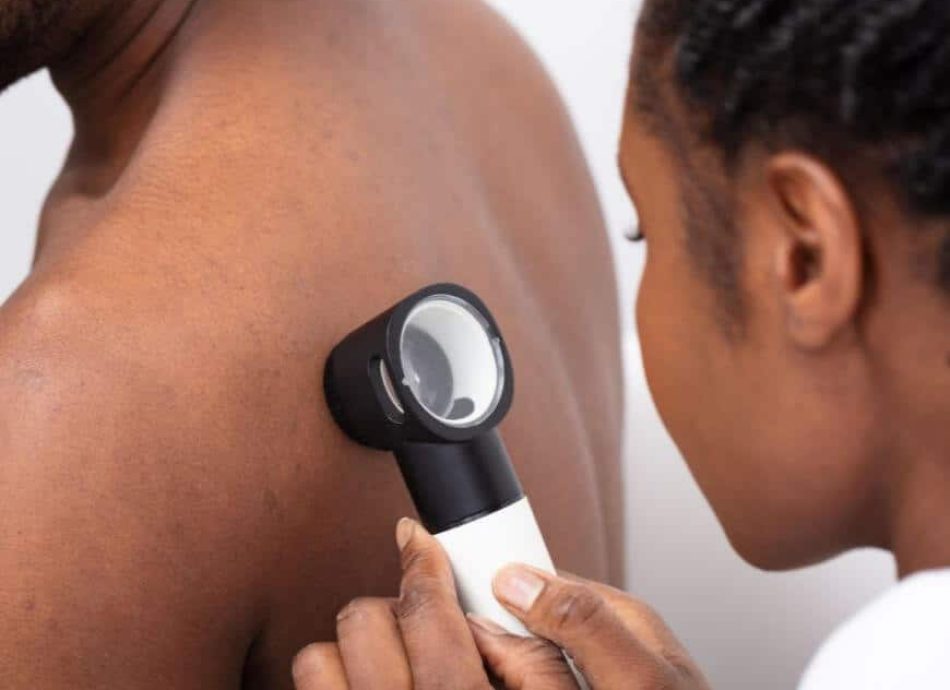Award winning dermatology service, with over 20 years on experience
Short waiting lists, on some occasions offering same week appointments
Safe environment, in Care Quality Commission approved facilities
Skin Cancer Treatments Include:
TREATING SKIN CANCER IN SHREWSBURY
Did you know that skin cancer is the most common form of cancer, with the rates continuing to rise year after year? Over 100,000 new cases are now diagnosed each year, and melanoma, the most aggressive subtype kills over 2,500 people each year in the UK – that’s seven people every day. Additionally, there has been a 70% increase in Melanoma cases among 25-49 year olds. While there’s more awareness of preventing the disease, many people still aren’t sure of the signs and symptoms to look out for.
Cancer starts when cells in the body begin to grow out of control. Any cells in any part of the body can become cancerous, and can then spread to other areas of the body. When it comes to skin cancer, there are two main categories- melanoma and non-melanoma.
WHAT CAUSES SKIN CANCER?
Exposure to sunlight is the most well known cause of skin cancer. The number of cases of skin cancer is on the rise, despite years of warning against excessive tanning and the dangers of sunbeds. People with paler skin (Fitzpatrick skin types 1-3) are at a higher risk of developing skin cancer as they are more vulnerable to damage from the sun’s ultraviolet (UV) rays.
You are also at an increased risk of skin cancer (melanoma), if you have a large number of moles. It is important to monitor any unusual shaped moles which are over 5mm. If you have concerns about a mole on your body, book a mole check with one of our experienced consultants.
MELANOMA
Melanomas, also known as ‘malignant melanoma’ and is less common than non-melanoma cancers, but it’s also the most dangerous of the two. Skin cancers that are not melanomas are often grouped as non-melanoma skin cancers because they develop from skin cells other than melanocytes. They tend to behave very differently from melanomas and are often treated with different methods. Basal cell and squamous cell cancers are by far the most common skin cancers, and actually are more common than any other form of cancer. Because Basal cell carcinomas are slow growing and rarely spread (metastasize) to other parts of the body, they are often diagnosed late. Squamous cell carcinomas on the other hand can grow rapidly and can spread, hence the urgency for treatment.
NON-MELANOMA
Non-melanoma skin cancers are mainly made up of ‘Basal Cell Carcinoma’ (BCC) and ‘Squamous Cell Carcinoma’ (SCC). Skin cancers that are not melanomas are often grouped as non-melanoma skin cancers because they develop from skin cells other than melanocytes. They tend to behave very differently from melanomas and are often treated with different methods. Basal cell and squamous cell cancers are by far the most common skin cancers, and actually are more common than any other form of cancer. Because Basal cell carcinomas are slow growing and rarely spread (metastasize) to other parts of the body, they are often diagnosed late. Squamous cell carcinomas, on the other hand, can grow rapidly and can spread, hence the urgency for treatment.
FREQUENTLY ASKED QUESTIONS
IS SKIN CANCER HEREDITARY?
Skin cancer is not hereditary in the sense that it is passed down through a gene. However, skin type does run in families so those more likely to develop skin cancer are often in the same family.
WHO IS MOST AT RISK OF GETTING SKIN CANCER?
Men are more likely than women to develop skin cancer and it is more common in the elderly.
WHAT FACTOR SUN CREAM SHOULD I USE?
It is recommended to use a high factor of sunscreen no matter your skin type. SPF30 with a 4-star UVA rating during the summer is recommended for those with paler skin to stop burning but also to help prevent wrinkles and sunspots in those who don’t burn as easily.
DO SUNBEDS CAUSE SKIN CANCER?
Research shows sun beds are a significant risk factor in skin cancer.
HOW CAN I PREVENT DEVELOPING SKIN CANCER?
Protecting your skin is, of course, always the best course of action. The easiest ways you can do this include:
- Wearing a waterproof, high level of SPF protection when in the sun
- Use a daily moisturiser with SPF protection
- Avoid the sun when it is at its strongest during the day
- Wear a hat when in the sun
- Sit in the shade
REQUEST A CALL BACK
Please fill in this form and one of our team will give you a call back to arrange a consultation with one of our expert dermatologists.

WHY TREAT YOUR SKIN CANCER AT ST. MICHAEL'S CLINIC?
Here at St. Michael’s Clinic, Shrewsbury’s leading private skin and laser treatment clinic, our experts are specialists in all aspects of dermatology, skin cancer, anti-ageing and beauty treatments. We are able to offer NHS patients consultant-led dermatology services in Shrewsbury.
St. Michael’s Clinic is regulated by the Care Quality Commission, ensuring the best level of treatment is provided to you in a safe environment. We are part of the Dermatology Partnership, a leading group of dermatology clinics, defined by clinical excellence and focusing on leading dermatological care.
